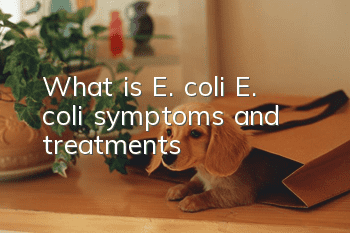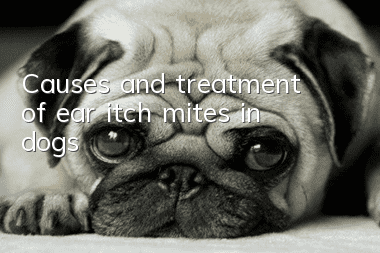What is E. coli? E. coli symptoms and treatments

Canine colibacillosis is an acute intestinal infectious disease in newborn puppies less than 1 week old caused by Escherichia coli. The clinical features are sepsis and diarrhea. Escherichia coli is widely found in the intestines, soil, feces, and water of healthy dogs. However, not all Escherichia coli are pathogenic. Only some pathogenic strains are caused by poor feeding and management, poor kennel hygiene conditions, and insufficient milk. , drastic changes in climate and other conditions can cause the disease in young dogs.
Symptoms of canine colibacillosis: Sick puppies show depression, physical weakness, and lack of appetite (see Figure 1-33). The obvious symptoms are abdominal pain, diarrhea, green, yellow-green or yellow-white discharge, uneven viscosity, and bandages. Feces with a fishy smell are often mixed with undigested curds and bubbles, and the area around the anus and tail are often contaminated by feces (see Figure 34, Figure 1-3S, Figure 1-36). In the later stages, sick puppies often show symptoms of dehydration, such as varicose veins, weakness of both hind limbs, wobbly walking, and lack of elasticity of the skin. Before death, body overflow dropped to below normal level. The fatality rate is high, and some patients develop neurological symptoms before death.
Treatment of Colibacillosis in Dogs If a sick dog is found, it should be treated immediately. Many drugs have good effects on E. coli, but they must be discovered during drought and treated early. Commonly used drugs include sulfa drugs, norfloxacin, and other anti-inflammatory and antidiarrheal drugs. For severe cases, glucose saline and sodium bicarbonate solution can be injected intravenously or intraperitoneally, and enough clean drinking water can be ensured to prevent dehydration. For puppies in the same litter who are not sick, the above drugs can be used to prevent it.
- What are the signs of blond hair in heat?
- What is going on when a dog has diarrhea? Finding the right cause is the key!
- What causes ulcers on the outer skin of the dog’s testicles?
- Solutions for dogs with irritable, whining, biting, and scratching behaviors
- What food should dogs eat if they have diarrhea?
- Is it good to neuter an Anatolian Shepherd Dog?
- Dog’s performance after giving birth
- What kind of dog food is good for Samoyeds and how to feed them
- How many days does it take for dogs to stop bleeding before they can be bred?
- How to clean Teddy's ear canal? Steps to clean your Teddy’s ear canal!



